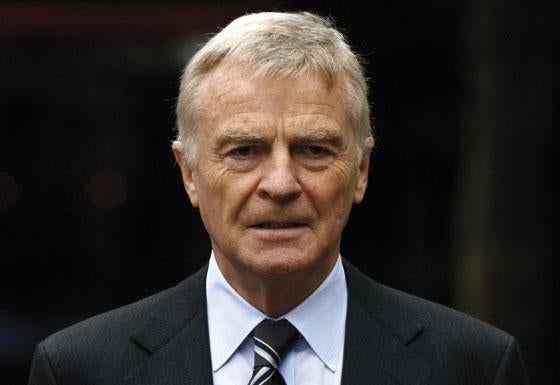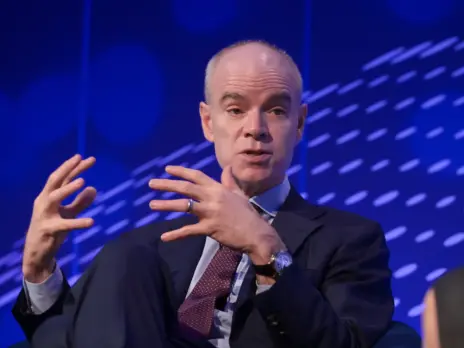
Ex-Formula One boss Max Mosley today lost his European Court of Human Rights bid to force newspapers to warn people before exposing their private lives.
The verdict in the European Court of Human Rights in Strasbourg marks the final stage in Mr Mosley’s campaign for tighter privacy laws following revelations about his sex life in the News of the World.
In 2008 the UK High Court awarded him £60,000 damages after ruling that there was no justification for a front-page article and pictures about his meeting with five prostitutes in a London flat.
But Mosley pursued the case to the Human Rights Court, challenging UK privacy laws which allow publication without giving targets advanced warning.
His lawyer told a hearing in January that the failure of UK law to oblige newspapers to notify their “victims” before exposing their private lives violated the European Human Rights Convention, to which Britain is a signatory.
The High Court damages award did not restore Mosley’s privacy, said Lord Pannick QC, but “prior notification” would have given him the chance to seek an injunction preventing publication.
Today’s verdict of the seven-judge court declared: “The European Convention on Human Rights does not require media to give prior notice of intended publications to those who feature in them.”
It said that in the UK the right to a private life was protected in several ways: by a system of self-regulation of the press; by access to civil courts to seek damages; and “if individuals were aware of an intended publication touching upon their private life” they could seek an interim injunction preventing publication.
In addition, said the judges, a UK parliamentary inquiry on privacy issues had been held recently with the participation of, among others, Mosley himself.
The resulting report had rejected the need for a “pre-notification” requirement.
The human rights judges said that during the case no evidence had been produced of any other country which had a “pre-notification” requirement, nor of any international legal texts requiring media to do so.
The judgment continued: “Last and not least, the current UK system fully corresponded to the resolutions of the Parliamentary Assembly of the Council of Europe on media and privacy.”
The concept of “private life” was sufficiently well understood for newspapers and reporters to be able to identify when a publication could infringe the right to respect for private life, said the judgment.
And if there were to be a pre-notification requirement in the law, it would have to allow for an exception if public interest was at stake.
“Thus, a newspaper could opt not to notify an individual if it believed that it could subsequently defend its decision on the basis of the public interest in the information published.”
The judges said that in Mr Mosley’s case, given that the News of the World had believed that the sexual activities it disclosed had Nazi overtones and were therefore of public interest, the paper could have chosen not to notify him, even if a legal pre-notification requirement had been in place.
Or a newspaper could choose to decline to notify, and prefer instead to pay a fine.
But, the judges said, “any pre-notification requirement would only be as strong as the sanctions imposed for failing to observe it”.
Also, particular care had to be taken when looking at possible constraints which might amount to censorship prior to publication.
“Although punitive fines and criminal sanctions could be effective in encouraging pre-notification, that would have a chilling effect on journalism, even political and investigative reporting, both of which attracted a high level of protection under the (Human Rights) Convention,” said the judgment.
That ran the risk of breaching rules on freedom of expression.
In last January’s hearing into the case, the British Government argued that current UK rules strike a good balance between the “right to private life” and the “right of freedom of expression” – both explicitly guaranteed by Articles 8 and 10 respectively of the Convention.
Today’s judgment observed that the private lives of those in the public eye had become “a highly lucrative commodity” for certain sectors of the media, and publication of news about such people contributed to the range of information available to the public.
The dissemination of such information was “generally for the purposes of entertainment rather than education” but it undoubtedly benefited from the protection of “freedom of expression” rules.
That protection might be overruled by the requirements of the “right to privacy” rules “where the information was of a private and intimate nature and there was no public interest in its dissemination”.
The judgment concluded: “However, looking beyond the facts of Mr Mosley’s case, and having regard to the chilling effect to which a pre-notification requirement risked giving rise, to the doubts about its effectiveness and to the wide margin of appreciation afforded to the UK in that area, the court concludes that Article 8 (the right to private life) did not require a legally binding pre-notification requirement.”
Email pged@pressgazette.co.uk to point out mistakes, provide story tips or send in a letter for publication on our "Letters Page" blog






